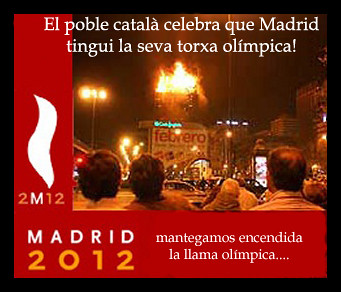RÈPLIQUES I REFLEXIONS SOBRE EL REFERÈNDUM
Alguns amics m'han fet arribar comentaris sobre el darrer post. En Salvador diu que de cap manera l'objectiu del tripartit era el trencament del PSC i del PSOE, sinó foragitar CiU del poder. Hi estic totalment d'acord. Potser jo no em vaig expressar bé. El que jo dic és que la millor conseqüència del tripartit, evidentment no volguda al començament, atès que no governava el PSOE, seria aquella que possibilités un trencament entre aquestes dues forces, o bé una visualització fefaent de la total i plena subordinació del primer respecte al segon. Em direu que això ja ha passat. És possible, però ¿ha quedat visualitzat per a àmplies capes de la societat catalana? Penso que no. Aquí té molt a fer ERC. Ha de trobar les escletxes que eixamplin les contradiccions entre les dues formacions. Que hi són, i existeixen. Penso, per exemple, que s'hauria de promocionar molt el paper de "tonto útil" que pot fer el conseller d'economia i finances. El seu zel professional, segurament no farà més que topar amb el sectarisme i el tancament de l'oligarquia central del PSOE. CiU també podria aportar el seu granet de sorra, però la cada cop més gran omnipresència de Duran i Lleida, és preocupant per al futur de la formació.
Sobre el referèndum. La trampa del vot en blanc
Bé ja s'ha celebrat el referèndum. Els resultats del no, si més no al Principat, han estat molt més alts dels que vaticinava el CIS fa uns dies. S'ha arribat al 28.07% de No,s i a un 7.29% de vots en blanc. Cal reflexionar sobre els resultats. Des del primer moment el Sí ha sortit reforçat per l'estratègia institucional i mediàtica. Ningú no dubtava que el Sí trauria més vots que el No. Ara bé, ha guanyat el Sí? Òbviament, si tenim en compte que de 35 milions d'electors, només 10.8 han votat a favor, podem dir que no ha guanyat. Ara bé s'ha beneficiat de l'estratègia de fragmentar el vot no-Sí. Efectivament, els ciutadans que no han donat suport a la llufa, no han posat els ous en un mateix cistell, sinó en tres. Uns, els més, s'han abstingut. Uns altres, han votat en blanc. I els tercers, han votat que no. La fragmentació del vot no-Sí, ha beneficiat al Sí.
Ara bé cal observar la trampa que ha significat la inclusió de paperetes per votar en blanc. S'ha fet una gran propaganda d'aquesta opció, i òbviament era una propaganda adreçada a aquells que no votarien que Sí. MAI abans, en cap elecció o referèndum, hi havia hagut paperetes en blanc. Ho dic clarament, s'ha incentivat que aquells que era clar que no votarien que sí, però que els feia angúnia votar que no -per exemple, per no ser titllats d'euroescèptics o de ser arrenglerats amb Le Pen o amb Batasuna- optessin per votar en blanc. D'aquesta manera s'afeblia el vot del NO. Considero que la immensa majoria del 7.29% de vots en blanc, si no haguessin pogut votar aquesta opció, haurien votat que NO. El vot en blanc, per definició, és un vot raonat i il.lustrat, cívic, per la qual cosa difícilment hauria anat a parar a l'abstenció. Tot i que és qüestionable, però si sumem, els vots pel No i els vots en blanc, al Principat, dóna un 35.36%. També és rellevant que aquest tipus de vot sigui molt més alt a Catalunya que al País Basc i Navarra. En definitiva, doncs, el PSOE, per enèsima vegada, ha tornat a jugar brut. Cal, això no obstant, aprendre aquestes lliçons... per quan siguem nosaltres qui els convoquem.
He dit.










